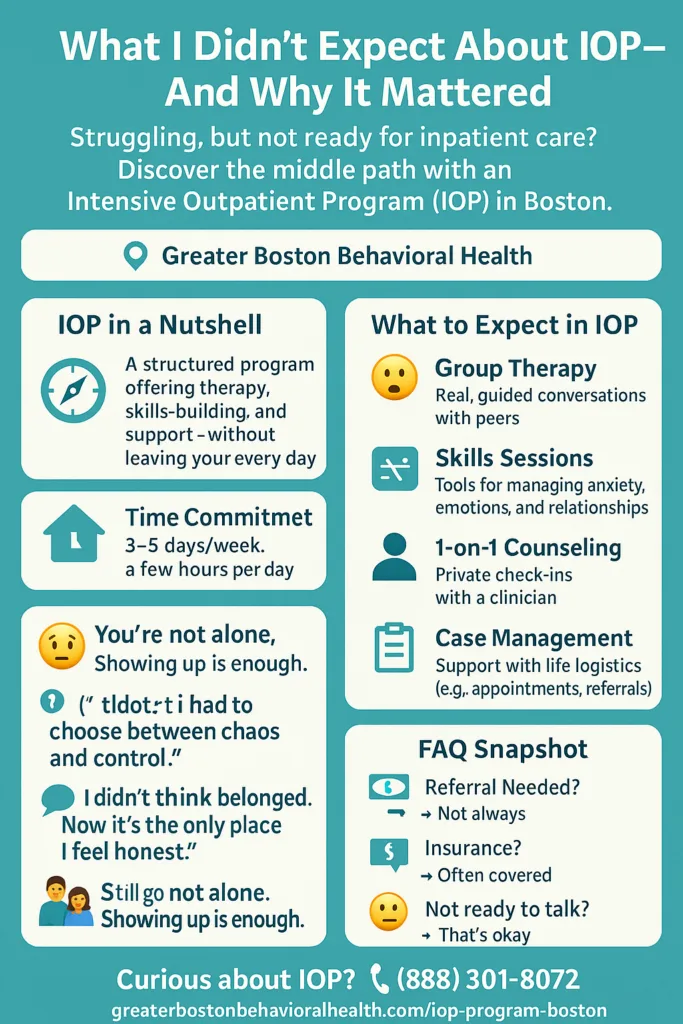There’s a moment I still think about. It was quiet, forgettable to anyone else—just me, sitting at the kitchen table, staring at my laptop. I’d typed “mental health treatment Boston” into a search bar at least five times that week. Inpatient sounded overwhelming. A once-a-week therapy session hadn’t been enough. And there, tucked between options, was something called an Intensive Outpatient Program.
It sounded clinical. Vague. I almost skipped right past it.
But something about the name—intensive and outpatient—stopped me. Could it really be both? Could I actually get help without disappearing from my life?
If you’re here, maybe you’re in that same quiet moment, trying to figure out what kind of help makes sense for where you are right now. Here’s what I learned that day—and what happened next.
I Thought I Had to Choose Between Chaos and Control
Back then, my world felt like it was splitting. Either I kept pretending everything was fine while barely holding it together, or I had to drop everything and go “away” for treatment. IOP showed me a middle path I didn’t know existed.
An intensive outpatient program doesn’t mean you’re “not sick enough” for inpatient. It means you get structured support while still living your life. You attend several days a week, for a few hours each session, combining therapy, skills-building, and connection in one integrated model.
At Greater Boston Behavioral Health, that structure isn’t just therapeutic—it’s stabilizing. It creates a rhythm in a time when everything else might feel unpredictable.
Walking In Was the Hardest Part
The first day, I was anxious. I didn’t know if I’d fit in. I was worried I’d be asked to bare my soul in front of strangers. But the intake process was clear and calming. The clinicians didn’t rush. They explained what would happen, what I’d be doing, and what I wouldn’t be expected to do.
There were no surprise “share circles.” No pressure. Just guidance.
That first group? I sat near the back. I listened more than I talked. And that was okay. Showing up was enough.
What Actually Happens in IOP?
Here’s the breakdown I wish someone had given me:
- Group Therapy: Real conversations, guided by licensed professionals, where you learn you’re not the only one thinking or feeling what you do.
- Skills Sessions: Practical tools like managing anxiety, regulating emotions, improving relationships.
- Individual Sessions: One-on-one support to check in on progress, set goals, and talk through things you might not want to say out loud in group yet.
- Case Management: Help with logistics—appointments, housing referrals, even family conversations if needed.
Everything is customized. At Greater Boston Behavioral Health, your plan evolves with you. They meet you where you are—then walk alongside you toward where you want to go.
It Felt Weird to Need Help—Until It Didn’t
For weeks, I’d carried the belief that needing more help meant failing. That I should’ve been able to “handle it.” But inside that room, I met people who had jobs, families, degrees, fears. People like me.
One day someone said, “I didn’t think I belonged here. Now it’s the only place I feel honest.” And everyone nodded. I felt myself exhale.
You don’t have to pretend in IOP. You don’t have to have a diagnosis memorized or a story polished. You just have to keep showing up.
“I was scared I wouldn’t fit in. But every single person in that room was trying. And that was enough.”
– IOP Client, 2023
IOP Let Me Stay Me—While Getting Better
What surprised me most was how life didn’t stop. I still picked my kids up from school. I still went to work. I still met friends for coffee—eventually, without pretending I was okay when I wasn’t.
IOP didn’t take over my life. It helped me return to it.
Greater Boston Behavioral Health’s program is built for real people with real responsibilities. That flexibility? It’s not just convenient—it’s compassionate. It lets healing happen without isolation.
FAQ: What You Might Be Wondering
What is an Intensive Outpatient Program (IOP)?
An IOP is a structured, clinically supported treatment option that allows you to receive care while continuing to live at home. It usually involves attending therapy and skills groups several days per week.
How long does an IOP last?
Most IOPs last between 6–12 weeks, depending on your individual needs. At Greater Boston Behavioral Health, we tailor the program length and intensity to you.
Do I need a referral to start?
Not always. You can call us directly at (888) 301-8072, and our admissions team will guide you through your options.
What if I’m not ready to share in a group?
That’s okay. Many people start IOP feeling hesitant. You’re never forced to share more than you’re comfortable with. We meet you where you are.
Will my insurance cover it?
IOP is covered by many insurance plans. We’ll verify your benefits and help you understand what’s included—before you commit.
Ready to Talk Through Your Options?
You don’t have to be “ready” in a big, life-altering way. You just have to be curious enough to ask.
Call Greater Boston Behavioral Health today at (888) 301-8072. We’ll walk you through what an intensive outpatient program could look like for you—step by step, at your pace.
And if now isn’t the moment? We’ll still be here when it is.


